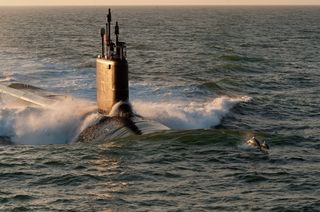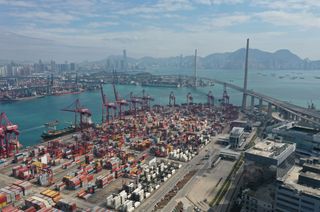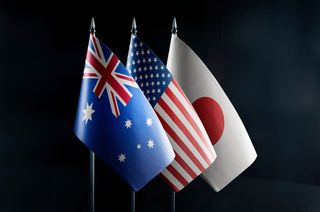US News & World Report
By Nicole Hemmer
"Donald Trump's mouth will end his presidential bid," editors at The Arizona Republic wrote after the real estate developer and Republican presidential candidate mocked Arizona Sen. John McCain's war service. Jazz Shaw at the conservative website Hot Air wrote that Trump had picked a fight which "he will likely not recover from." Yet a week and a half later, Trump is still topping national polls. The first bubble of the 2016 Republican primary has formed, and if these predictions are any sign, commentators still don't understand what primary bubbles are and why they happen.
These rapid-rise (and rapid-fall) candidacies were largely unheard of prior to 2012. Sure, candidates had collapsed in spectacular fashion before. There was George Romney in the 1968 race, claiming he had supported the Vietnam War because he had been "brainwashed" by U.S. generals. And Ed Muskie, whose campaign-trail tears (or was it just a melting snow?) put an end to his 1972 presidential hopes. But it wasn't until 2012 that there was enough money, media and disaffection to fuel a series of effervescent candidacies. And despite the GOP's efforts to decarbonate the primary season, Trump's early surge suggests this election cycle will look a lot like 2012.
Why didn't the GOP primary reforms work? Because the Republicans' problem isn't their calendar — it's their coalition.
The key to understanding the primary bubble is the populist segment of the party's conservative base. These populists, like other conservatives, are fed up with all the usual suspects: President Barack Obama, liberals, the media. But they are also angry at the Republican establishment and any candidate they feel is beholden to it. So they flock to candidates that voice their resentment. Even now, support for Trump is not a measure of how many people want him to be president — there's precious little yearning for a Trump presidency on talk radio or right-wing blogs — but rather how many Republicans feel antagonistic toward their own party.
This antagonism invariably sends populist conservatives straight into the arms of unelectable candidates. That's because the very things that make a candidate a likely nominee — broad appeal, pragmatism, flexibility and establishment support — raise suspicions among populists looking for someone ideologically pure and uncompromising. The problem is that there is never a candidate who satisfies the populist right's need for purity.
Even Ronald Reagan was in constant conflict with the party's populists, who in the 1970s and 1980s were known as the New Right. In the 1980 primaries, Reagan was the New Right's third choice, behind Illinois Rep. Phil Crane and former Texas Gov. John Connally. And during his presidency the New Right griped endlessly about everything from his staffing choices to his foreign policy. Discussing an arms-control treaty the president had negotiated, one New Right leader called Reagan "a useful idiot for Soviet propaganda."
Lacking any sufficiently pure candidate, the populist right settles instead for shock value. This explains why voters in search of an ultra-conservative candidate have ended up backing people like Trump (whose policy positions are nebulous), or a latter-day Newt Gingrich, who prior to his 2012 rise had accused House conservatives of "right-wing social engineering" and partnered with then-House Speaker Nancy Pelosi, a Democrat, to combat climate change.
The same thing that makes a primary bubble — anti-establishment populism — also explains why these bubbles burst. For former Texas Gov. Rick Perry, the first beneficiary of populist support in 2012, the crash came when he voiced support for the DREAM Act, calling fellow candidates heartless if they opposed legislation to fund education for children of undocumented workers. This was the real "oops" moment of Perry's campaign — he never led the polls again after making that remark. The populist right believed that the comment revealed Perry as just another stooge for the pro-amnesty establishment.
That anti-immigration populism also explains why Trump, who became a frontrunner after suggesting Mexican immigrants were rapists, risked little when he insulted McCain. Conservative populists see McCain as the face of the Republican establishment, particularly on the issue of immigration reform. (They also feel he was insufficiently supportive of former Alaska governor and McCain's 2008 running mate Sarah Palin.) And while it may seem like attacking a politician's military service is a fatal error, remember that in 2004 Republican delegates wore bandages decorated with purple hearts to mock then-Democratic presidential candidate John Kerry's service and commendations.
The Trump bubble will eventually burst. It's possible he will follow the Herman Cain track. (Caindropped out of the 2012 race over allegations of sexual harassment). On Monday, the Daily Beast ran a story about Ivana Trump's allegations of sexual abuse during her marriage to Trump, causing his spokesperson to comment (falsely), "You cannot rape your spouse. And there's very clear case law." Or he might pull a Newt Gingrich and simply non-sequitur his way out of the lead. (Moon colonies, anyone?) But the particulars of the Trump bubble matter less than its existence. The Republican party has a populism problem, and they still haven't figured out a way to solve it.
This article was originally published in the




